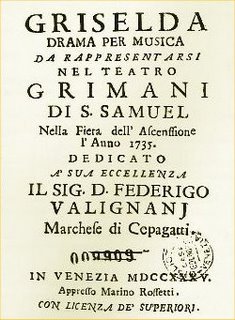 In 1735 at the Teatro S. Samuele in Venice the opera Griselda, written by Antonio Vivaldi, was first performed. This year saw the release of the Ensemble Matheus' recording of this little-known work, under the direction of Jean-Christophe Spinosi (Naïve: OP30419). Their efforts were rewarded with the prestigious Diapason d'Or and the reviews have all been glowing.
In 1735 at the Teatro S. Samuele in Venice the opera Griselda, written by Antonio Vivaldi, was first performed. This year saw the release of the Ensemble Matheus' recording of this little-known work, under the direction of Jean-Christophe Spinosi (Naïve: OP30419). Their efforts were rewarded with the prestigious Diapason d'Or and the reviews have all been glowing.The story of Griselda has its first major outing in fourteenth-century Italy where it appears as the final story in Boccaccio's great story-collection Decameron. It became a real bestseller, however, when Francesco Petrarca translated the tale into Latin and included it into his collection of Letters of Old Ages (Res seniles), and indeed it split off from the Seniles and was copied separately and disseminated extremely widely. Chaucer encounters the story and incorporates it into his Canterbury Tales as the tale told by the Clerk of Oxenford. And the story has had a very prestigious lineage of adaptation in French from the fourteenth century onwards.
Vivaldi's Griselda, whose libretto was written by Apostolo Zeno and revised by none other than Carlo Goldoni, presents considerable differences in plotting. The most striking is exactly why Gualtiero tests his patient wife: to convince his people of her worthiness. The very opening of the opera has the people reject Griselda, while Gualtiero wants to marry her. In order to convince them of her virtues he proceeds to test her. While the plots turns a little...baroque at times, it is fascinating to think of Chaucer and his represenation of the people who follow the mercurial will of their leader, accepting the new bride-to-be with alacrious amnesia. The Clerk calls them unsad and evere untrewe, exactly the opposite of Griselda, who is sad (long ago pointed out by Brewer). This is a key theme in the tale, key virtues in medieval literature. For Vivaldi, on the other hand, Griselda's repudiation by the people is a device to introduce another suitor (Ottone) who declares his undying love for her, while the young daughter (Costanza), spirited away long before, and now recalled to 'play' bride-to-be, has her own heartbroken lover (Roberto).
You need a map to follow the rest of this so I shan't go into it here, but the music is fantastic, the recording super, the research wonderful.
No comments:
Post a Comment